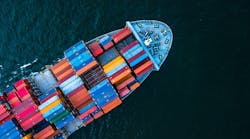My parents recently semi-retired to Florida, more specifically, the Jacksonville area. This past month we took a trip down to visit them – right around the time the missing Titan submersible was capturing news headlines everywhere.
At the time, I wondered how they’d find the tiny sub, but another, older maritime story was capturing my attention: the loss of El Faro.
See, upon moving to the large port city of Jacksonville, my ever-social parents run into many folks working in the shipping industry. During one conversation, a Port of Jacksonville dockworker shared with my Midwestern “flatlanders” that she worked the very port where El Faro was last seen.
If you haven’t heard of El Faro, I suggest a Google search (I went down a rabbit hole while on vacation scouring the many news articles), but in a nutshell, the story goes like this: The cargo ship, packed to capacity, departed Jacksonville for Puerto Rico on September 29, 2015, when a tropical storm began brewing. The storm strengthened into a Category 4 hurricane. Rather than divert to avoid the storm’s path, the ship's captain figured he could “outrun” it. The ship went down in the eye of the hurricane; all 33 lives aboard perished.
After learning about the story, and with the search for Titan going on, I was curious to learn more about the ship’s fateful voyage and why a seasoned captain – with modern technology – would ever make such a decision, and more importantly, if the ship was ever found (it was).
Between El Faro and Titan, I learned that any industry, including the chemical industry, can learn things from these major maritime catastrophes and others like them. Here are a few things that immediately came to mind after reading about both events:
- Check your ego at the door. Safety and pride don’t go hand in hand. It’s better to be wrong and keep your workers safe. According to some reports, Titan’s CEO believed his submersible’s construction was worthy of any potential risk.
- Listen to the naysayers. When multiple people question a decision, consider looking into it more before dismissing any warnings (also, see ego). Several of the crew aboard El Faro questioned the captain’s decision making, and there are reports of the same from those who worked with Titan’s CEO.
- Question the data. The El Faro’s captain unknowingly relied on old information to chart his course. Certainly, embrace modern technology, but it’s good to have a healthy dose of skepticism or, at the very least other sources to verify information.
- In your plants, does your technology match the process? Both El Faro and Titan used questionable, even outdated, technology and equipment. El Faro had lifeboats similar to those used on the Titanic that would do no good in a hurricane. Titan used a long list of technologies that were not exactly suitable for a submersible.
I’m sure there are more lessons than just these. What are some things you’ve applied to your operations that you’ve gleaned from other industry disasters?



